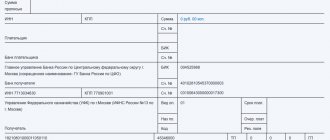State duty is a payment that is transferred to official structures for the services they provide that are necessary for a citizen in a certain life situation. The Tax Code provides for several cases when exemption from payment of state duty is made. To take advantage of this benefit, the nuances of the situation must meet some important conditions. We will find out how later in the article.
Exemption from payment of state duty
Benefits for paying state fees when filing a claim
The Civil Procedure Code of Russia regulates cases of exemption from payment of state fees when filing applications with magistrates, courts of general jurisdiction and the Supreme Court of the Russian Federation, when it comes to:
- realization of the legal rights and interests of people with disabilities (if the claim is not of a property nature);
- protection of the rights of minors;
- adoption of an orphan;
- payment of compensation for moral and/or material damage caused in connection with criminal prosecution (for violation of freedoms and rights);
- on payment of compensation for moral and/or material damage that occurred due to the offense;
- on compensation for damage caused by the death of the breadwinner;
- for compensation for damage to health through injury or mutilation;
- payment of alimony;
- collection of benefits, wages, and other requirements related to the work process.
Criteria for preferential relief on state duty
The motives underlying preferential duties depend on the category of the payer, his financial situation, the composition of legally significant actions, as well as on the price component of the claim.
Special status of persons
According to the Tax Code, benefits on state duties, along with full exemption, are provided to the following group of persons:
- Heroes of the USSR, holders of all three degrees of insignia of the Order of Glory, Heroes of Russia are 100% released in cooperation with the domestic state judicial system.
- A number of legally significant actions are not subject to fees if participants (veterans, disabled people) of the Patriotic War, former prisoners of concentration camps and repatriates apply to the court.
- Creators of works representing cultural values are not subject to state penalties when moving (import/export) their own works.
- After the Republic of Crimea became part of the Russian Federation in 2014, when replacing a passport and other Ukrainian-style documents with Russian equivalents, no state duty is charged to Crimean residents.
- Minor orphans and children deprived of guardianship, in accordance with Russian laws aimed at supporting childhood, do not pay a state fee when issuing a civil passport of the Russian Federation.
- Citizens officially recognized as low-income are exempt from duties when preparing documents for ownership of real estate or purchase and sale agreements and other types of alienation of real estate.
- Authors of intellectual property who have developed computer software, created a database and protected topology of ICs (integrated circuits).
- The loss of a passport or irreparable damage to a document by a citizen of the Russian Federation under force majeure or emergency situations is the reason for issuing a new document to the affected person without paying a state fee.
- Persons with limited legal capacity or minor citizens who carry out civil transactions for the sale of real estate in emergency buildings scheduled for major repairs or being prepared for demolition have the right not to pay state duty. Similar benefits for paying state duty are granted to individuals who own the said real estate together with partially capable or minor family members.
Please note: persons are exempt from duty taxes when registering a patent, provided that the creators are students of educational institutions or are disabled.
To confirm the right to state duty, payers must submit accompanying documents, for example:
- military ID;
- act on the emergency condition of the house, etc.
The list of documents for exemption from fees is specified in paragraph 2 of Article 335 (section 35).
Download for viewing and printing:
Article 333. Features of maintaining tax accounting of income (expenses) on repo transactions
Article 335. Registration as a taxpayer of mineral extraction tax
Federal Law of January 12, 1995 No. 5-FZ “On Veterans”
Appeals to court and state duty privileges
The criteria for a plaintiff to receive benefits in paying state fees in courts in cases of subordinates of general jurisdiction depend on the subject of the appeal. Criminal, administrative, and civil cases the subject of consideration of which are:
- Tax levies do not apply to labor disputes demanding monetary compensation for wages and other benefits.
- Compensation for treatment of injuries and other health damage.
- Collection of alimony support.
- Compensation to the victim for moral and material damage from the defendant.
- Relief is provided for compensation of damage after the loss of a breadwinner.
- Compensatory monetary payments that compensate for damage caused as a result of illegal prosecution are not subject to payment.
- Citizens receive tax penalty relief when filing an application to adopt a child.
- It is not paid for claims to protect children's interests and rights.
- Complaints against officials and civilians guilty of violating the rights of people with disabilities also receive relief.
- Application from administrative persons for compulsory psychiatric examination or placement of a patient in a psychiatric hospital.
Note: reliefs on duties depending on the subject of appeal and the status of the applicant are provided for by Federal Law and regulated by Article 333 (Section 36) of the Tax Code of the Russian Federation.
Benefits depending on the value of material claims
Claims related to material compensation are not subject to fees up to the amount determined by Tax legislation. According to this code, if the amount of monetary compensation does not exceed 1 million rubles, then the right to tax relief is granted to:
- Individuals who have claimed a violation of consumer rights.
- Disabled people (except group III).
- Participants in war and hostilities who have declared violations of the rights regulated by Federal Law No. 5 “On Veterans” are entitled to relief.
- Retired citizens making material claims against the Pension Fund or non-state pension organizations. Military pensioners, when presenting property claims to executive authorities, are similarly exempt from paying state duty and receive a tax break.
If the material requirements exceed the amount of 1 million rubles, the state duty is calculated as:
GPupl = GPtot - GP1mln, where
- GPupl - final amount paid;
- GPtot - duty fee for the entire amount of the claim;
- GP1 million - preferential amount up to 1 million rubles.
Other state concessions on state duty
The following actions are exempt from paying tax:
- cassation and appeal appeals against court decisions are not burdened with payment of penalties;
- request for deferment of execution of court decisions;
- the fee is not charged when filing a claim to appeal against the unlawful actions of the bailiff;
- complaints about procedural violations in the conduct of criminal cases;
- failure to comply with legal acts regarding the rehabilitation of victims repressed for political reasons, persons receive relief;
- citizens' complaints about forced hospitalization are not burdened with state payment;
- citizens receive relief when challenging refusals to actually grant refugee or forced migrant status;
- the duty does not apply if the author refuses to use the fruits of intellectual property.
Prosecutors, when applying to the courts to protect the rights of citizens, organizations, and constituent entities of the Russian Federation, also do not need to pay a state fee.
Benefits for paying state duty depending on the value of the claim
If we are talking about the consideration of civil and administrative cases, and the amount of the claim does not exceed 1 million rubles , the state duty should not be paid:
- pensioners who have claims against the Pension Fund and non-state pension funds;
- veterans of combat and military service, when it comes to protecting their legal rights;
- associations and public organizations of people with disabilities;
- plaintiffs who brought cases involving violations of consumer rights.
Benefits for paying state duty in other cases
The Commissioner for Human Rights in Russia is exempt from transferring state fees to the budget when filing petitions to verify a court decision, ruling, decree or sentence that has entered into force.
State duty is not paid:
- prosecutors applying to protect the interests, rights and freedoms of people, regions, municipalities and the country;
- state bodies, regional bodies, as well as federal ministries, agencies and services acting as plaintiffs;
- when considering claims in the interests of consumers.
In addition to the situations mentioned above, the current legislation of the Russian Federation allows not to pay state duties in the following cases:
- If we are talking about filing a claim for granting the author the right to use and dispose of the results of intellectual work in cases where a third party has a monopoly right to the invention.
- When an administrative case is initiated regarding the subject of forced hospitalization of a citizen in a psychoneurological dispensary and/or an examination for legal capacity.
- When considering cases challenging the refusal to recognize a citizen and members of his family as refugees and internally displaced persons.
- In proceedings regarding the application of legislative acts on the restoration of the rights of citizens recognized as victims of repression during the USSR period (but not in the case of proceedings between victims of repression and their successors).
- When filing a claim by individuals who wish to file a cassation complaint in criminal proceedings, when it comes to the legality of compensation for property damage caused due to a crime.
- When filing a complaint within the framework of proceedings for an administrative violation, filing an application with a request to appeal the (in)actions of a bailiff, filing administrative claims, filing a private complaint against a court ruling.
- When the court receives an application with a request to defer the execution of a court decision in the case, to review a decision in absentia, to reverse the execution of a court decision, to open a new trial due to the discovery of new circumstances in the case.
- When filing a cassation or appeal in a divorce case by the plaintiff or defendant (both parties are exempt from the fee).
- When issuing papers to legal entities and individuals in criminal cases and civil cases on the payment of alimony to dependents.
Exemption from duties for officials and government agencies
It should also be noted that, for example, prosecutors will be exempt from paying the state fee for going to court if the cases they insist on considering are directly related to statements regarding:
- protection of civil rights;
- freedoms given to the population of the country by law and their interests;
- interests of the entire country as a whole and separately the interests of its subjects and municipalities.
Another official, the Commissioner for Human Rights in the Russian Federation, will not pay the state fee. But only on the condition that he submits a petition to the court to verify what has previously entered into legal force:
- sentence;
- regulations;
- definitions;
- court decisions.
If the plaintiff, in particular of an administrative nature, or the defendant is any state structure or local government body of a specific territory, they also do not pay a state fee for participation in the proceedings.
Some officials and government bodies are also exempt from paying payments to the court for services provided.
Common mistakes
Error: The Association of Disabled People paid a state fee when filing an application to the court.
Comment: Associations of disabled people, as well as public organizations of people with disabilities, do not have to pay state fees to the court. However, if the price of the claim exceeds 1 million rubles, state duty is paid on the amount in excess of 1 million rubles.
Error: The pensioner filed a lawsuit due to inaction on the part of the Pension Fund, and he paid the state fee.
Comment: The state duty is not paid in such cases - the citizen has every right to demand what he is entitled to by law. The price of the claim should not exceed 1 million rubles, otherwise you will have to pay a fee for the amount of the claim in excess of the specified amount.
Conclusion
Exemption from payment of funds due to the state is possible only on legal grounds, the list of which is not so wide. However, after carefully studying the article, you may notice that you belong to the category of beneficiaries or your business has the right focus. In any case, the amounts of government fees are usually not so significant that you have to worry about paying them. And in situations where the amount is really large, measures will probably be taken to ease your financial burden.
Answers to common questions about state duty benefits
Question No. 1: I need to file a claim in court, but my financial situation currently does not allow me to pay the state fee, what should I do?
Answer: The judge has the right to reduce the amount of the state fee and provide you with an installment plan if you prove that you are in a difficult financial situation.
Question No. 2: A claim regarding the protection of consumer rights has been filed, is there an exemption from paying state fees for consideration of the case in court in this case?
Answer: Yes, for such a case there is an exemption from transferring funds to the budget to pay the state duty, but only if the cost of the claim does not exceed 1 million rubles.
Benefits when applying to arbitration courts
Arbitration courts hear cases related to disputes between entrepreneurs and legal entities. The following have the benefit in the form of exemption from paying state fees when applying to arbitration courts, as well as to the Supreme Court of the Russian Federation in arbitration cases:
- prosecutors and other government bodies who apply to the courts in cases provided for by law in defense of state and (or) public interests (clause 1, clause 1, article 333.37 of the Tax Code of the Russian Federation);
- state bodies, local government bodies acting as plaintiffs or defendants (clause 2, clause 1, article 333.37 of the Tax Code of the Russian Federation);
- plaintiffs in claims related to violation of the rights and legitimate interests of a child (clause 2, clause 1, article 333.37 of the Tax Code of the Russian Federation);
- authors of the result of intellectual activity in claims for compulsory licenses (clause 3, clause 1, article 333.37 of the Tax Code of the Russian Federation);
- public organizations of disabled people acting as plaintiffs and defendants for claims up to 1 million rubles (clauses 2 and 3 of Article 333.37 of the Tax Code of the Russian Federation);
- plaintiffs are disabled people of groups I and II with a claim price of up to 1 million rubles (clauses 2 and 3 of Article 333.37 of the Tax Code of the Russian Federation).




